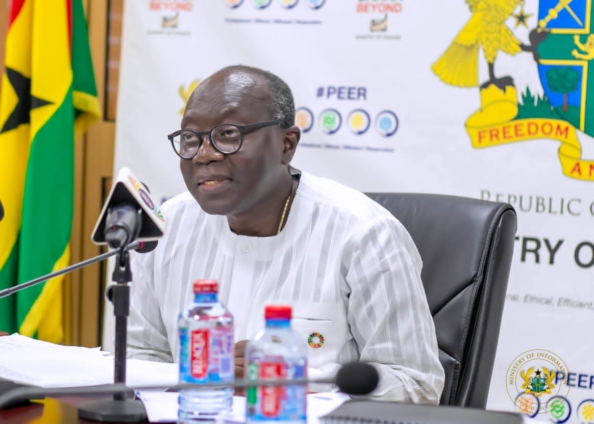Finance Minister, Ken Ofori-Atta has expressed disappointment with the recent downgrading of the country’s Long-Term Local – and Foreign-Currency Issuer Default Ratings (IDRs) from ‘CCC’ to ‘CC’.
This is the second time in 2022 that the rating agency has downgraded Ghana’s creditworthiness.
The Minister in an address on the country’s economic status on Wednesday reacted to the recent downgrade and said it is unfortunate for the country’s economy as the country would lose foreign investors in that regard.
“The issue of Fitch downgrade is unfortunate. In their email to us, they referred to the Bloomberg article that influenced their decision. It sort of further depresses the bonds on the international market and results in additional losses to investors.”
Ken Ofori-Atta is, however, optimistic that the ratings will compel the government to initiate economic programmes that would enable the economy bounce back and return to some positive ratings.
“Once we got downgraded to triple C, we are also expecting that economic programme that is being worked on which will be the basis for the IMF discussions would help us to come back to some strong matrices so that we will be able to get some ratings revised over that period.
“We are confident that returning some sort of access to the capital markets is going to take some time, two to three years and so during that period we will work on our ratings also to be able to get back,” he said.
It could be recalled that on September 23, Rating agency, Fitch downgraded Ghana’s credit worthiness.
The downgrade, Fitch said, reflects the increased likelihood that Ghana will pursue a debt restructuring given mounting financing stress, with surging interest costs on domestic debt and a prolonged lack of access to Eurobond markets.
“There is a high likelihood that the International Monetary Fund support programme currently being negotiated will require some form of debt treatment due to the climbing interest costs and structurally low revenue as a percentage of Gross Domestic Product”.
“We believe this will be in the form of a debt exchange and will qualify as a distressed debt exchange under our criteria”, it explained.
“However, we believe there could be an incentive to spread a debt restructuring burden across domestic and external creditors and therefore do not have a strong basis to differentiate between Foreign- and Local-Currency ratings at this time,” it concluded.
Latest Stories
-
Gold Fields Ghana Foundation challenges graduates to maximize benefits of community apprenticeship programme
24 mins -
GBC accuses Deputy Information Minister Sylvester Tetteh of demolishing its bungalow illegally
35 mins -
Boost for education as government commissions 80 projects
46 mins -
NAPO commissions library to honour Atta-Mills’ memory
57 mins -
OmniBSIC Bank champions health and wellness with thriving community walk
59 mins -
Kora Wearables unveils Neo: The Ultimate Smartwatch for Ghana’s tech-savvy and health-conscious users
1 hour -
NDC supports Dampare’s ‘no guns at polling stations’ directive
1 hour -
Police officer interdicted after video of assault goes viral
1 hour -
KNUST’s Prof. Reginald Annan named first African recipient of World Cancer Research Fund
1 hour -
George Twum-Barimah-Adu pledges inclusive cabinet with Minority and Majority leaders
2 hours -
Labourer jailed 5 years for inflicting cutlass wounds on businessman
2 hours -
Parliament urged to fast-track passage of Road Traffic Amendment Bill
2 hours -
Mr Daniel Kofi Asante aka Electrician
2 hours -
Minerals Commission, Solidaridad unveils forum to tackle child labour in mining sector
2 hours -
Election 2024: Engagement with security services productive – NDC
2 hours

